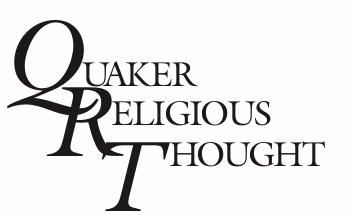
Abstract
ABOUT THIS ISSUE
Welcome to the fall issue of Quaker Religious Thought! The papers from this issue were presented at the January 2022 Quaker Theological Discussion Group sessions. The theme of the sessions was, “Decolonizing the Quaker Peace Testimony.” The articles printed here challenge all Friends to reflect on the use of the Quaker peace testimony, and especially the ways it has been used to enable oppression. This is a difficult and important conversation to have, because for many Friends the Quaker peace testimony has only ever been conceived of as an act of obedience to God and an unqualified benefit to society. And yet, our authors identify the ways that the Quaker peace testimony has sometimes been built on views of superiority and domination. These articles help us to reflect carefully on the way that colonialist assumptions have been interwoven with the practice of many of our cherished traditions and testimonies. The authors speak from their own experience as advocates of just peace, and I encourage you to listen to their voices. In “Unsettling: On Palestinian Quaker Theology,” Sa’ed Atshan reminds us that Christianity is an indigenous religion for Palestinians. Decolonizing Quaker theology can be aided by acknowledging the contributions and perspectives of Palestinian Quakers and learning from them. In “Decolonizing the Quaker Peace Testimony in the Global South,” Cristina Montiel relates her experience with Friends and identifies how British and North American Friends sometimes assume positions of dominance over Friends in the Global South, perpetuating colonizer mentalities. Trayce Peterson’s article, “Radical Hospitality and Peace,” provides tools for decolonizing the peace testimony by anchoring it in a radical hospitality for others, and especially those who have been historically oppressed. tom kunesh reminds Friends that Quakers have participated and benefitted from colonialism. Quakerism, tom reminds us, owes 4 · Jon R. Kershner much to the imperial position of the British Empire. Decolonizing Quakerism is, thus, no simple matter. It calls on Friends to examine their historical roots and present conventions. tom challenges capitalization and spelling patterns descended from imperial conquest as an act of indigenous resistance, and I hope you will read the article as a challenge for all of us to question the foundations of our assumptions and inherited privileges. Finally, Mark Bredin reviews Stuart Master’s new book on James Nayler, The Rule of Christ: Themes in the Theology of James Nayler (Brill Publishers, 2021).
Recommended Citation
Kershner, Jon R.
(2022)
"Frontmatter, Quaker Religious Thought, No. 139,"
Quaker Religious Thought: Vol. 139, Article 1.
Available at:
https://digitalcommons.georgefox.edu/qrt/vol139/iss1/1
